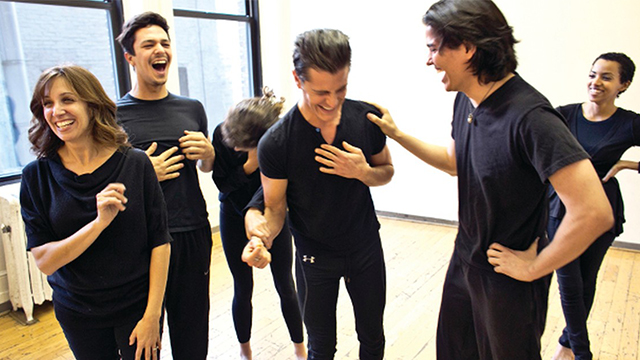“The Kids are Alright: An Open Letter to the Parents of a Theatre Arts Major”
Written by Alexandra Muscaro
July 12th, 2019
So, your baby is finally heading off to college. You’re already nervous enough as it is for them to be on their own for the first time, but the anxiety soars through the roof when you realize they are going to be a Theatre Major. What sort of real-world skills will they learn in theatre school? How can they possibly make a living for themselves with a B.A. in Theatre Arts? What will happen after graduation? Well, let me put your mind at ease and answer all these questions and more.
To the Parents of a Theatre Major,
First and foremost, please take a nice, big, deep breath for me. Now let it out. So, your baby is finally heading off to college. You’re already nervous enough as it is for them to be on their own for the first time, but your anxiety is no doubt soaring through the roof now that you’ve realized they are going to major in theatre. Yes, I know what exactly you’re thinking: What sort of real-world skills will they learn in theatre school? How can they possibly make a living for themselves with a B.A. in Theatre Arts? What will happen after graduation? Well, let me put your mind at ease and answer all these questions and more.
Work Ethic

By majoring in theatre, your child will develop a work ethic a business major could only dream of having. In the theatre world, early is on time, on time is late, and late is unacceptable, meaning that your child will learn how to be 10 minutes early to absolutely everything! The days of running into your son’s or daughter’s room to shake them awake for school are now a thing of the past. I was always a pretty punctual person, but because of my college-level performing classes, I am now chronically early to absolutely everything, even dates!
Organizational Skills

In addition to being on time, a theater education demands preparation and organizational skills. There is so little control a performer has in the casting process, but the one thing they have absolute control over is their individual preparation. A person in the performing arts must know as much as they can about each audition or assignment they have to tackle, while also having the resources and flexibility to adapt to what may be asked of them. This is a huge point drilled into every theatre major’s mindset. This tenacity can be applied to nailing any job interview! By practicing proper preparation, your child will also undoubtedly develop a reputation of being disciplined and reliable; time management is an invaluable quality for any field.
Team Player Masters

One of the main aspects of working in theatre is a lesson that has consistently been preached since preschool; how to become a master team player. The most successful projects are those with a tight-knit and supportive ensemble, just like every Broadway show. They will experience what it is like to be a leader as well as learning how to address other team members with respect. During my freshman year, my acting teacher would require the entire class to manage and organize our ensemble rehearsals on our own time. Requiring everyone to work together, and we had to journal our progress for every aspect of the rehearsal. She would even collect our rehearsal journals for a grade. I’ve been doing shows since I was about six years old, well before attending college. This experience was only a fraction of what I thought I knew what it meant to be in an ensemble and how to work with others successfully. My higher education, in theatre, taught me that I was wrong all along, and I learned very quickly the power our words and vocal inflections have. Learning how to work with others successfully is genuinely a critical skill any employer is not only grateful but looking for as a quality of their team.
Public Speaking Skills

Also, all theatre majors become incredible public speakers. Four years of college-level performance-based classes will teach them how to stand in front of fully packed audiences and speak in a full, clear voice, without a shred of fear. This characteristic isn’t limited to just performance folks. Playwright and costume construction majors have to learn how to present their projects to classes and creative teams. These students are taught the same communication and self-presentation skills as if they were Broadway bound on-stage actors. No matter the degree focus every student is taught how to perform in front of packed venues for eight shows a week, pitch brilliant stories to big-shot producers, sell their design choices to a director. As a result, they will have no difficulty properly communicating ideas to large crowds or even intimate presentations. Public speaking is a real fear many adults have, find comfort in knowing that is one less fear your youngster will have.
Resourcefulness

Theatre majors learn how to be resourceful due to the nature of the industry. Yes, a “survival job” is inevitable in-between auditioning and performing. However, due to the extraordinary skill sets, they have adapted from their years in college, acquiring said job will not be a feat. Most people don’t realize just how versatile performers really are. Future Theatre Arts graduates will be incredibly independent and will use their new knowledge to chase their dreams with more enthusiasm than ever before. Never underestimate the power of a dream, I genuinely mean that.
On behalf of your children, I want to thank you for believing in their dreams, and more importantly, their choices. They wouldn’t have pursued this amazing career if it wasn’t for you paying for those voice lessons and driving them to and from rehearsals for years and years. You are no doubt their biggest fan, and they would not be able to enter into this crazy beautiful world of theatre if it wasn’t for you being right by their side.
So, take another breath for me and relax. I promise they will be just fine.

Need some advice? We’ve got you covered.
- 10 Tips for Being a Positive Role Model in Your Theatre Community
- 5 Ways to Say “Thank You” to Your Cast and Crew
- 5 Character Development Techniques to Use in Rehearsals
- 5 Small Ways to Get Into (And Embrace) Your Character
- 5 Ways to Take Care of Yourself During Tech Week
- Devising Theatre: 7 Quick Tips for Your First Devising Project
- “I Can’t, I Have Rehearsal”: 5 Tips for Scheduling Your Life When You’re In Theatre
- How to Make Rehearsals A Warm and Welcoming Environment
- 10 Basic Rules of Stage Combat (That Keep Everyone Safe)
- 5 Advantages of Learning Stage Combat
- Theatre Artists on a Budget: How to Be Smart and Healthy While Pinching Pennies
- Productions on a Budget: Finding Props/Costumes/Set Dressings/Set Pieces Without Breaking the Bank
- 6 Steps to Memorizing Shakespeare
- 5 Helpful Tips for Attending Callbacks
- 10 Tricks to Staying Healthy All Season Long
- How to Balance Theatre and Coursework
- 10 Items Every Actor Should Carry in Their Rehearsal Bag
- 10 Items Every Dancer Should Keep in Their Rehearsal Bag
- Discover the Delightfully Nerdy World of Dramaturgy
